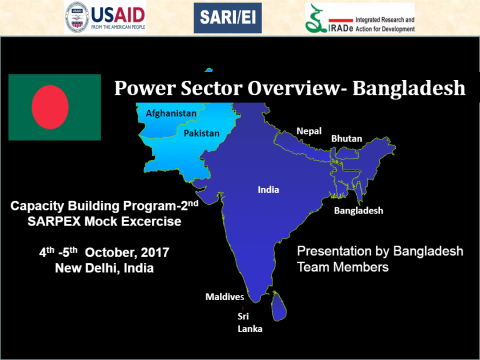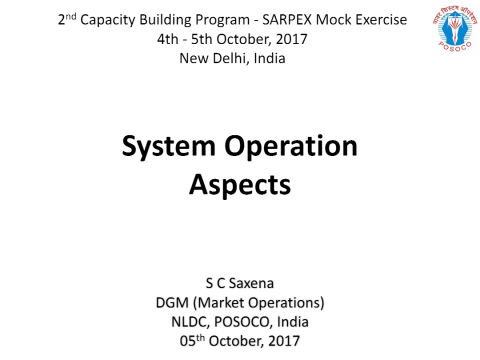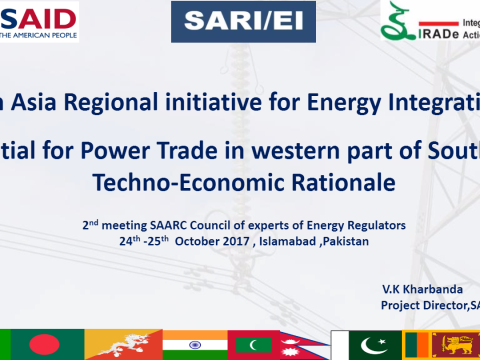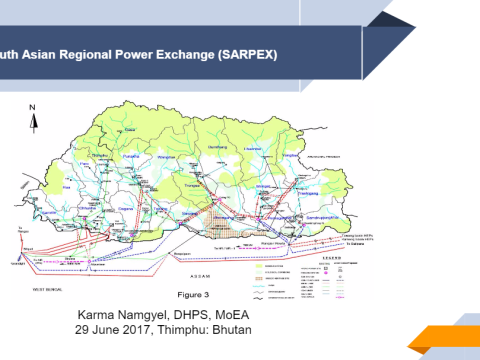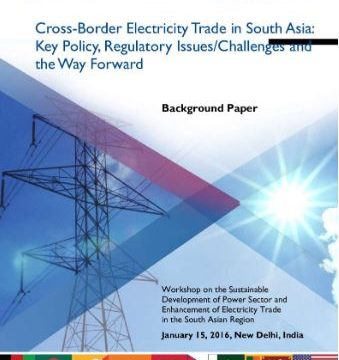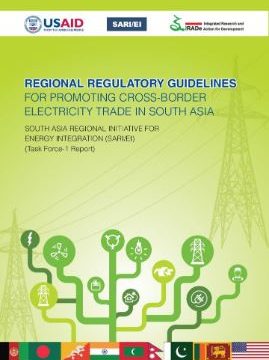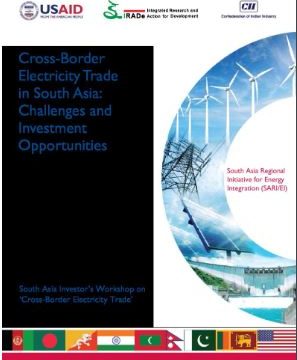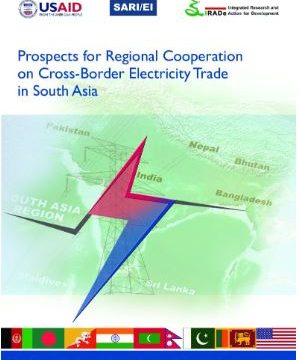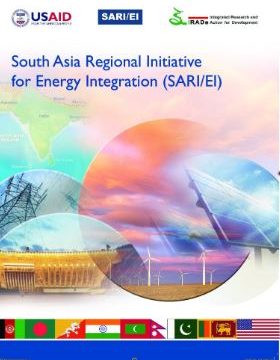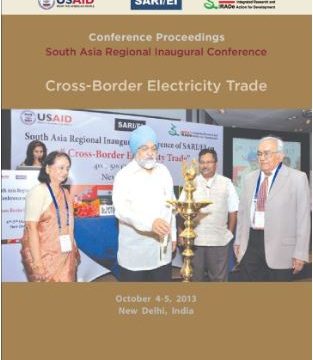Regional Power Trade and Markets
February 25, 2022
Finding out the most needed quantum of power – criticality of load to be served.
February 25, 2022
The stakeholder consultation helped in dissemination of SARPEX idea to the relevant sectors.
February 25, 2022
Policy intervention of Indian Govt . and regulatory framework needs to be updated accordingly. Necessary amendment for this regulation is required before finalization of the document.
February 22, 2022
Decades back, Dr. R. Buckminister Fuller proposed interconnecting regional power system into a single, continuous world-wide electric energy grid as a number one solution to solve many of the world’s pressing problems.
February 22, 2022
Presentation on "Potential for Power Trade in western part of South Asia"-V K Kharbanda
February 1, 2022
Various bilateral and multilateral funding organizations (USAID-SARI/EI program, ADB-SASEC Program, SAARC, etc. are supporting the CBET which is necessary for economic growth of SA region.
February 1, 2022
Need for Institutionalizing the Process of CBET such as Creating Forum/Association of Regulators(SAFER) , Forum/Association of Transmission utilities (SAFTU)
January 26, 2022
Without a consistent and coherent regional regulatory framework in place, investment opportunities and, consequently, large-scale CBET between nations that could benefit both importing and exporting nations may not happen. In the South Asian regional context, the risks associated with forging an intra-regional, CBET project would be greatly minimized if each participating country adopts complementary regulatory frameworks to facilitate cross-border interconnection and electricity trade. The SAARC Inter-Governmental Framework Agreement (IGFA) also calls for the need for institutional mechanisms for the coordination of regulations for promoting CBET in the South Asia (SA) region.This paper brings out the above by analyzing the international experiences in power market development and CBET from a) Greater Mekong Region (GMS) b) South African Power Pool (SAPP) c) West African Power Pool (WAPP) d) The Central American Electrical Interconnection System (SIEPAC) e) Nordic Pool and the critical success factors for effective CBET and learnings for South Asian countries from international experiences. The report also highlights the various key drivers of CBET in SA and the current policy, legal, and regulatory frameworks in the region. I hope this paper will be able to initiate further thought-provoking discussions among regulators and power sector stakeholders to take forward the process of coordination of policy and regulation for promoting CBET.
December 26, 2021
Cross Border Electricity Trade (CBET) in South Asia is currently being undertaken in the form of bilateral trade and is limited between India-Nepal; India-Bangladesh; and India-Bhutan. The SACs envisages a manifold increase in the quantum of Cross Border Electricity Trade (CBET) by the end of next decade.There is a need to have Common/Coordinated set of Regulations, Policies and Legal Framework which addresses the mechanism of interconnection, recognizes the CBET, Open access to transmission Network, licensing, dispute resolution, etc. The above necessitate establishment of Regional Regulatory Guidelines (RRGs) in the form of common regulations, rules and protocols in technical, operational and legal matters for promoting CBET in the South Asian Region. This report focuses only on the Regional Regulatory Guidelines (RRGs). The RRGs aims to 1) establish transparent regulatory environment to promote CBET 2) to provide a common course of action that can be referred for decision making on CBET by the electricity/energy Regulators in their respective countries 3) to ensure consistency in the transactions and remove delays on account of unclear and complicated regulatory regimes applicable to such transactions.i
November 26, 2021
Over the last two decades, South Asia (SA) has been one of the fastest growing regions in the world, with an average annual GDP growth rate of six percent. The region has a variety of energy resources with major potential for hydropower. This potential offers a huge scope for tapping clean energy and meeting South Asia’s energy needs. Yet, despite the potential and the macroeconomic growth in this region, the power sector has not been able to keep pace with the demand. The region continues to experience problems of shortage of electricity supply and its quality. Crossborder transmission interconnections and trading transactions are taking place to a limited extent. The systematic deployment of huge energy resource potential, especially hydropower, along with an investment in infrastructure build-up and a market-based trade system, can help harness untapped sources of clean energy. The paper aims to initiate thought-provoking discussions among power sector stakeholders and provide a platform for investors, developers, financial institutions, MDBs, and high-level officials from the South Asian countries to engage in a dialogue on challenges and investment opportunities in South Asia’s power sector and to enhance Cross-Border Electricity Trade (CBET).
October 26, 2021
Energy remains one of the key inputs to socio-economic progress in developing societies. South Asian nations, namely Afghanistan, Bangladesh, Bhutan, India, the Maldives, Nepal, Pakistan, and Sri Lanka, have so far lagged far behind their developed counterparts in terms of access to clean, reliable, and affordable energy, especially electricity. The existing power shortages and growing import of fossil fuels impose a heavy cost of energy insecurity to the region. The energy endowments of South Asia are limited and dispersed across the region, with large unexploited hydro-electric potential in some parts and growing dependence on fossil fuels in other parts. The South Asia region is going through a phase of economic transformation from low growth to high growth. It is well established that energy demand and growth are interlinked with each other; therefore energy demand in this region is going to increase substantially to keep its growth story intact. Cross-border electricity trade could emerge as a strong viable long-term solution to increase the supply of energy in the region. South Asia’s electricity security is one of the steps critical to regional stability.
October 26, 2021
Over the last two decades, South Asia (SA) has been one of the fastest growing regions in the world, with an average annual GDP growth rate of six percent. The region has a variety of energy resources with major potential for hydro power. This potential offers a huge scope for tapping clean energy an meeting the region's energy needs. Yet despite the potential and the macroeconomic growth in this region, the power sector has not been able to keep pace with the demand
October 26, 2021
IRADe, the implementing partner of USAID for the Program of South Asia Regional initiative for Energy integration (SARI/EI) organised the South Asia Regional Inaugural Conference of SARI/EI on Cross Border Electricity Trade(CBET) at New Delhi on 4th and 5th Oct’2013.



